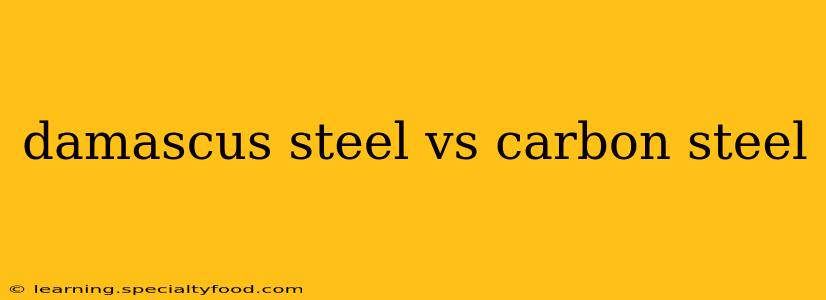For centuries, bladesmiths and knife enthusiasts have debated the merits of Damascus steel versus carbon steel. Both offer unique properties, making the choice dependent on intended use and personal preference. This comprehensive guide delves into the key differences, helping you understand which steel is right for your needs.
What is Damascus Steel?
Damascus steel, famed for its distinctive swirling patterns and legendary sharpness, isn't a single type of steel but rather a composite material. Historically, it was crafted through a complex process of forging and welding together different types of steel and iron, resulting in a blade with superior strength and flexibility. The iconic patterns are a byproduct of this intricate process, with each individual layer contributing to the overall performance. Modern "Damascus steel" often replicates this aesthetic through techniques like pattern-welding, using similar steels to create a visually appealing, though not necessarily historically accurate, product.
What is Carbon Steel?
Carbon steel, on the other hand, is a simpler alloy consisting primarily of iron and carbon. The carbon content dictates its properties; higher carbon content generally translates to greater hardness and edge retention but can also lead to increased brittleness. Lower carbon content results in more durable, but less hard, steel. Different grades of carbon steel exist, each optimized for specific applications.
Damascus Steel vs. Carbon Steel: Key Differences
| Feature | Damascus Steel | Carbon Steel |
|---|---|---|
| Composition | Composite material (multiple steels/iron) | Primarily iron and carbon |
| Pattern | Distinctive swirling patterns | Usually uniform in appearance |
| Hardness | Varies depending on the constituent steels | Varies depending on the carbon content |
| Toughness | Generally tough and resilient | Varies greatly depending on the carbon content |
| Edge Retention | Excellent, but varies based on composition | Excellent to poor, depending on carbon content |
| Maintenance | Requires regular care and oiling | Requires regular care, susceptibility to rust varies |
| Cost | Typically more expensive | Relatively less expensive |
What are the advantages of Damascus steel?
The advantages of Damascus steel often center around its aesthetics and historical significance, along with its generally superior performance characteristics:
- Exceptional Sharpness and Edge Retention: The layered structure contributes to a remarkably sharp edge that holds its keenness for a longer time.
- Durability and Flexibility: The combination of different steels often leads to a blade that’s both tough and resilient.
- Unique Appearance: The swirling patterns are undeniably beautiful and highly desirable.
What are the advantages of carbon steel?
Carbon steel offers advantages in terms of affordability and availability:
- Cost-Effectiveness: Generally more affordable than Damascus steel.
- Ease of Maintenance: Depending on the grade, some carbon steels are easier to maintain and sharpen than Damascus steel.
- Wide Range of Properties: Different carbon contents allow for tailoring the steel to specific needs.
Which steel is better for knives?
The "better" steel depends entirely on the intended use and your priorities.
- For high-end chef's knives or collector's pieces: Damascus steel's exceptional sharpness, beauty, and historical significance often make it the preferred choice.
- For everyday use or budget-friendly options: Carbon steel offers a great balance of performance and affordability.
Is Damascus steel rust-resistant?
No, Damascus steel is not inherently rust-resistant. Regular oiling and proper maintenance are crucial to prevent rust, as is true with many types of carbon steel.
How do I care for my Damascus steel knife?
Proper care is essential to preserve the beauty and performance of your Damascus steel knife. This includes regular oiling, hand washing, and careful storage to prevent damage and corrosion.
How much does Damascus steel cost?
The cost of Damascus steel varies greatly depending on the quality of the steel, the complexity of the pattern, and the reputation of the bladesmith. Expect to pay significantly more than for similarly sized carbon steel knives.
This detailed comparison should empower you to make an informed decision when choosing between Damascus steel and carbon steel. Remember to consider your priorities, budget, and the intended use of the blade. Whether you're drawn to the historical allure and exceptional performance of Damascus steel or the practicality and affordability of carbon steel, both offer compelling options for knife enthusiasts.
